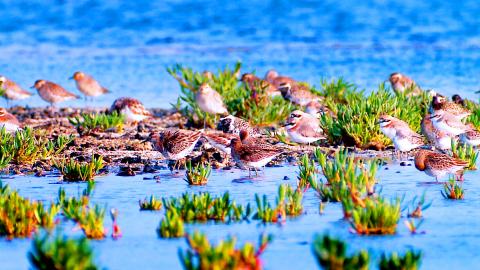The Ministry of Science and Technology is to boost scientific facilities on the Pratas Islands (Dongsha Islands, 東沙群島) and Itu Aba Island (Taiping Island, 太平島), and increase collaborations with Southeast Asian countries, a ministry official said yesterday.
Minister of Science and Technology Chen Liang-gee (陳良基) on Friday led a delegation of 64 government officials and researchers to inspect facilities on Pratas, and meet with US and Japanese scientists.
The inspection is part of the ministry’s four-year Integrated Program for Intelligent Prevention of Natural Disasters and International Cooperative Research on Earth Sciences in Southeast Asia, which began last month and runs through 2022, Department of Natural Sciences and Sustainable Development Director-General Wu Chun-chieh (吳俊傑) said.

Photo: Copy by Tsai Ching-hua, Taipei Times
The program — composed of four subsidiary projects — aims to boost the nation’s atmospheric, maritime, Earth science and disaster prevention research efforts on and around the islands, and to share technologies with countries included in the government’s New Southbound Policy, Wu said.
First, the ministry plans to enhance research equipment at the scientific research station on Pratas, as well as improve its maintenance and support systems, with National Sun Yat-sen University professor of oceanography Soong Ker-yea (宋克義) serving as project head, Wu said.
Humanities researchers were part of the inspection, with an eye to inspiring new research based on the island’s extraordinary social and cultural conditions, he said.
On Itu Aba, the ministry is seeking to advance atmospheric observations by upgrading surface-based observation infrastructure, installing new cloud observation facilities and launching more climate data-gathering equipment, with National Taiwan University Department of Atmospheric Science chair Lin Po-Hsiung (林博雄) leading the project, Wu said.
The third project is to share the nation’s disaster prevention and early-warning systems for earthquakes with Southeast Asian countries, given that “Taiwan is a leader in disaster prevention studies in the region,” Wu said, adding that the project would be managed by National Science and Technology Center for Disaster Reduction Director Hongey Chen (陳宏宇).
Through the fourth project, the ministry plans to fortify connections between Taiwanese and Southeast Asian academics, and foster student and expert exchanges, with Academia Sinica Institute of Earth Sciences director Chung Sun-lin (鍾孫霖) leading the project, Wu said.
Hopefully, the projects would enlarge the nation’s presence on the global stage and lead to more bilateral and multilateral collaborations, Wu said, adding that the ministry is focused on scientific research and collaborations, not political issues.
The ministry is to share research findings with scientists working for Year of the Maritime Continent, a two-year project that began last year to study the climate of the Earth’s largest archipelago, which stretches from the Indian Ocean to the Pacific Ocean, Wu said, adding that Taiwan contributes by sharing observations collected on Itu Aba and Pratas.

Tropical Storm Gaemi strengthened into a typhoon at 2pm yesterday, and could make landfall in Yilan County tomorrow, the Central Weather Administration (CWA) said yesterday. The agency was scheduled to issue a sea warning at 11:30pm yesterday, and could issue a land warning later today. Gaemi was moving north-northwest at 4kph, carrying maximum sustained winds near its center of up to 118.8kph and gusts of 154.8kph. The circumference is forecast to reach eastern Taiwan tomorrow morning, with the center making landfall in Yilan County later that night before departing from the north coast, CWA weather forecaster Kuan Shin-ping (官欣平) said yesterday. Uncertainty remains and

SEA WARNING LIKELY: The storm, named Gaemi, could become a moderate typhoon on Wednesday or Thursday, with the Taipei City Government preparing for flooding A tropical depression east of the Philippines developed into a tropical storm named Gaemi at 2pm yesterday, and was moving toward eastern Taiwan, the Central Weather Administration (CWA) said. Gaemi could begin to affect Taiwan proper on Tuesday, lasting until Friday, and could develop into a moderate typhoon on Wednesday or Thursday, it said. A sea warning for Gaemi could be issued as early as Tuesday morning, it added. Gaemi, the third tropical storm in the Pacific Ocean this typhoon season, is projected to begin moving northwest today, and be closest to Taiwan on Wednesday or Thursday, the agency said. Today, there would likely

DISRUPTIONS: The high-speed rail is to operate as normal, while several airlines either canceled flights or announced early departures or late arrivals Schools and offices in 15 cities and counties are to be closed today due to Typhoon Gaemi, local governments announced last night. The 15 are: Taipei, New Taipei City, Taoyuan, Tainan, Keelung, Hsinchu and Kaohsiung, as well as Yilan, Hualien, Hsinchu, Miaoli, Chiayi, Pingtung, Penghu and Lienchiang counties. People should brace for torrential rainfall brought by the storm, with its center forecast to make landfall on the east coast between tonight and tomorrow morning, the Central Weather Administration (CWA) said. The agency issued a sea warning for the typhoon at 11:30pm on Monday, followed by a land warning at 11:30am yesterday. As of

CASUALTY: A 70-year-old woman was killed by a falling tree in Kaohsiung as the premier warned all government agencies to remain on high alert for the next 24 hours Schools and offices nationwide are to be closed for a second day today as Typhoon Gaemi crosses over the nation, bringing torrential rain and whipping winds. Gaemi was forecast to make landfall late last night. From Tuesday night, its outer band brought substantial rainfall and strong winds to the nation. As of 6:15pm last night, the typhoon’s center was 20km southeast of Hualien County, Central Weather Administration (CWA) data showed. It was moving at 19kph and had a radius of 250km. As of 3pm yesterday, one woman had died, while 58 people were injured, the Central Emergency Operation Center said. The 70-year-old